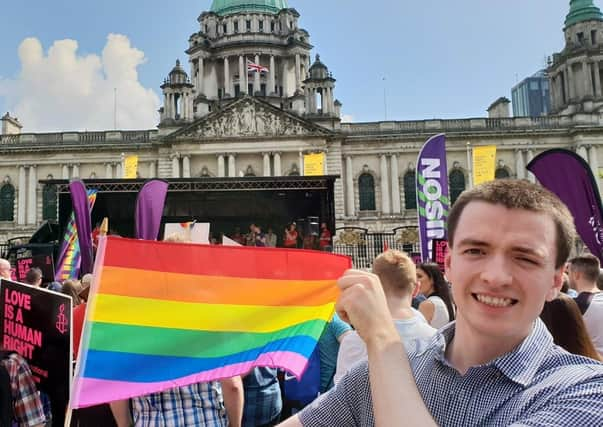I am gay, unionist, and proud – and 2021 will give us the chance to show off the diversity of our cause


I joined the UUP in 2013, having liked what I heard in the speeches of one of its former leaders and my own current MLA, Mike Nesbitt. One speech of his that stuck with me was made in his first year as leader, where he reflected on the centenary of the signing of the 1912 Ulster Covenant. He proclaimed: “I don’t want to start by looking back; I want to look the other way: looking forward 100 years, what will our descendants think of us?”
This is still a relevant question for unionism to be mindful of as we forge our legacy. I will admit that I did not always consider myself a confident unionist in the sense that during my teenage years – the most difficult years of my life – when I first started following politics, I was alienated from political unionism due to the anti-LGBT (lesbian, gay, bisexual and transgender) language from certain unionist politicians.
Advertisement
Hide AdAdvertisement
Hide AdI found it very confusing and disheartening to see some of the politicians I was supposed to look up to and be inspired by as role models for my community referring to people like me dismissively in harsh terms. Eventually, those same teenagers grew up to become voters and the long-term effects of the damaging language used is no doubt played out in who they vote for and in their attitudinal perceptions of different political forces. People remember what was said and how it made them feel for a lifetime.
As a gay unionist, out and proud nowadays, one of my motivations to get involved in politics was to campaign on LGBT issues such as same-sex marriage and to raise awareness of issues such as homophobia in society and what can be done politically about it, as at the time they weren’t often discussed in the media and some politicians were – in fairness – not knowledgeable on them. There was a clear purpose.
That initial consciousness of issues that directly affected me expanded into the constitutional question and on my views on other issues discussed in NI, British and international politics. Identity politics is only one strand. There are other strands that are socioeconomic, constitutional and even local such as the management of public services.
I accept those damaging views from over a decade ago were not entirely representative of unionism at that time but they were the views that made the headlines.
Advertisement
Hide AdAdvertisement
Hide AdThankfully, I later realised that I should not allow others to determine my political allegiances and I decided to get involved in unionist party politics to be part of the change that I wanted to see within unionism. Views towards LGBT people within unionism are better today than they were then but there is still a mountain of work to be done. The fact that some people still smirk at me when I admit to being a unionist is evidence of that.
Other non-predominant groups within unionism can probably identify with my own experience and yearn for the day of normalisation within unionism.
I believe an inclusive centenary of Northern Ireland’s founding is unionism’s greatest opportunity to remould itself as a positive, welcoming, all-embracing political force that can effectively sell the benefits of remaining in the union with Great Britain for another 100 years to soft unionists and to those who identify as Other.
To do this, we need to reflect and affirm the aspirations of those we want to win the support of to remould and broaden unionism. Unionism is very diverse but this diversity is rarely on show at a representative level; instead, it is hidden within the memberships of the various unionist parties that only politicos know of. It is for the leaderships of unionist parties to best decide how they wish to put forth their diverse talent to appeal to an ever-changing Northern Ireland.
Advertisement
Hide AdAdvertisement
Hide AdI see inclusive centenary celebrations that also explore the hidden histories and experiences of all of Northern Ireland’s unionists as a solution in the short term to build support for the union. It will be an excellent opportunity for unionism to showcase its diversity that our descendants can be inspired by for generations to come.
l Michael Palmer, 27, is chairman of Ards and North Down Young Unionists, and unsuccessfully stood in the Comber council district last year